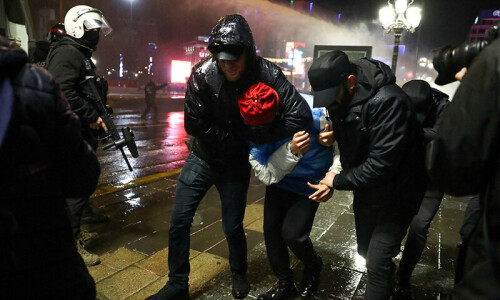ISLAMABAD: In a move that resembled more an exit strategy than an attempt to pile pressure on the Pakistan Tehreek-i-Insaf-led federal government, Jamiat Ulema-i-Islam-Fazl (JUI-F) chief Maulana Fazlur Rehman called off the party’s 13-day sit-in in Islamabad on Wednesday.
However, the Maulana announced that his party would continue its anti-government protests in other regions of the country as part of its so-called Plan B.
The JUI-F chief directed his followers to reach their native areas as soon as possible for a nationwide lockdown.
The move brought embarrassment to the Pakistan Peoples Party, which until now had supported the Azadi march, but had no option other than to declare that it would not allow the right-wing party to expand its protests to PPP-ruled Sindh.
Political observers put down Maulana Fazlur Rehman’s decision to a fear of losing its supporters if heavy rains lash the capital again. A good number of the sit-in participants, mostly belonging to Sindh, melted away after the city received rains last week.
That spell brought disease and misery to the protesters’ camps and discouraged many would-be participants from joining the sit-in.
Claims Azadi march has transformed JUI-F into key political force; PPP not to allow road blockade in Sindh
No representatives from the two main opposition parties — Pakistan Muslim League-Nawaz and PPP — were present when Maulana Fazl made the announcement during his address to the protesters. He did not specify whether or not he had the consent of the opposition’s Rehbar Committee to end the sit-in.
While announcing the Plan B of Azadi march on Tuesday, the JUI-F chief had said the sit-in on 100-foot-wide Kashmir Highway and an adjoining ground would end with the resignation of Prime Minister Imran Khan.
A key supporter of the sit-in, Pakhtunkhwa Milli Awami Party leader Mehmood Khan Achakzai, was on the stage when Maulana Fazl announced the decision to call off the sit-in.
The JUI-F chief announced that his party’s anti-government movement would continue across the country. He spelled out the achievements made under the Plan A of Azadi march, which began from Karachi on Oct 27 and reached Islamabad on Oct 31. He claimed that the “steadfastness and resilience” shown by the JUI-F workers had transformed the party into a political force to be reckoned with.
“We are called a small party in parliament, but your movement has transformed it into a major party,” he told the crowd. “You have become the axis of Pakistani politics.”
He claimed that the sit-in had shaken the incumbent “illegitimate rulers” and the Plan B, involving lockdown of key arteries, would “chop off the trunk” of the government.
Highlighting another achievement of the sit-in, the Maulana said his followers had defeated the mindset that always caused harm to democratic norms and supremacy of the Constitution. He said the sit-in was being transformed into a fight for other causes dear to “your hearts”.
The Maulana said the lockdown of main roads outside the cities was planned so that locals did not suffer and the movement of humanitarian workers, ambulances and firefighting vehicles was not disturbed. “I appeal to the masses to join the movement and support the lockdown as this fight is for your caused and I direct my workers to take along the local populace with you to block the roads,” he said. “We have the support of Almighty Allah and that power will provide us strength in these fronts too.”
The Maulana asked his followers to avoid any kind of clash. “The blood of my workers is dear to me, but at the same time the blood of my countrymen, including army, FC and police personnel, is equally dear to me.”
At the same time, he warned the state institutions not to disturb the Azadi march caravans and respect the JUI-F workers in their sit-ins across the country. “If you remove us from one place we will shift to another and if we are forced to vacate that spot we will appear at the third one, but our movement will not end without resignation of Imran Khan and holding of free and fair elections in the country,” he declared.
Earlier in his speech, Jamiat Ulema-i-Pakistan chief Owais Noorani lambasted the establishment, former chief justice of Pakistan Saqib Nisar, the Muttahida Qaumi Movement and Prime Minister Khan for their failure to bring rule of law to the country.
Soon after the announcement of ending the sit-in, the participants started packing up their tents and other belongings to board the waiting vehicles which had brought them to Islamabad.
In Karachi, Sindh Information Minister Saeed Ghani was asked about the proposed plan of blockades of roads and highways by the JUI-F. “It can never be allowed,” he said. “If any individual or group plans to take to the streets, blocks the roads, puts hurdles to people’s life and challenge the writ of the government, it’s not going to happen. We don’t want anyone to disturb common man’s life and it’s the prime duty of the government to keep regular business normal with all due security and protection.”
Published in Dawn, November 14th, 2019


















































